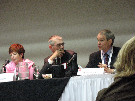
(2)
|
By advancing the teachings of the late Peter F. Drucker, the Institute seeks to stimulate effective management and ethical leadership across all sectors of society. Wartzman is also a columnist for BusinessWeek online. His most recent book, Obscene in the Extreme: The Burning and Banning of John Steinbeck's The Grapes of Wrath, was picked as a Borders "Original Voices" selection and named by the Los Angeles Times as one of its 25 favorite nonfiction books of the year. It was also a finalist for the Los Angeles Times Book Prize in history. Wartzman is the co-author, with Mark Arax, of the bestseller The King of California: J.G. Boswell and the Making of a Secret American Empire, which was selected as one of the 10 best books of 2003 by the San Francisco Chronicle and one of the 10 best nonfiction books of the year by the Los Angeles Times. It also won, among other honors, a California Book Award and the William Saroyan International Prize for Writing.
Target Audience:
This session will be useful for physicians, clinical pharmacologists, pharmacists, regulators and other healthcare professionals who want to increase their understanding of clinical pharmacology strategies in developing therapeutic proteins.
Background Requirement:
An understanding of basic concepts of preclinical and clinical pharmacology and its utility in drug development.
Goal:
For the audience to become familiar with the PK/PD properties of monoclonal antibodies.
Objectives:
At the conclusion of this program, participants should be able to:
1. Describe the PK/PD properties of monoclonal antibodies;
2. Explain the unique challenges in interspecies scaling of monoclonal antibodies;
3. Acquire appreciation of how modeling and simulation can inform dose selection in the development of monoclonal antibodies.
1:30 – 1:35 pm
Introduction
Megan A. Gibbs, PhD, Director, Pharmacokinetics Drug Metabolism, Amgen, Inc
1:35 – 2:20 pm
Preclinical Considerations for mAbs
Joseph P. Balthasar, PhD, Professor and Director for the Center for Protein Therapeutics, Dept of Pharmaceutical Sciences, School of Pharmacy and Pharmaceutical Sciences, University of Buffalo, The State University of New York
2:20 – 3:00 pm
Clinical Pharmacology Development Strategy for Monoclonal Antibodies
Diane R. Mould, PhD, President, Projections Research
3:15 – 4:00 pm
Quantitative Prediction of Human Pharmacokinetics for Monoclonal Antibodies
Megan A. Gibbs, PhD, Director, Pharmacokinetics Drug Metabolism, Amgen, Inc
4:00 – 4:40 pm
Target-based Dosing Strategies of Monoclonal Antibodies: Applications to Special Populations
JF Marier, PhD, FCP, Vice President and Lead Scientist, North America, Pharsight Consulting Services
4:40 – 5:15 pm
Regulatory Considerations in the Modeling and Simulation of mAbs
Jogarao Gobburu, PhD, Director, Div of Pharmacometrics, Office of Clinical Pharmacology and Biopharmaceutics, Pharmacometrics, Center for Drug Evaluation and Research, Food and Drug Administration
5:15 – 5:30 pm
Panel Discussion
Learning Format and Method of Participation:
To obtain CME/CPE credits, each participant should:
1) View the content presented;
2) Review the Faculty Disclosures located within the “materials” tab;
3) Complete the post activity evaluation;
4) Complete and submit the post test questions and get a passing grade of 75% or higher (note that you may retake the post test if necessary to achieve a passing grade of 75%). Only those who achieve a score of 75% or higher will receive credit;
5) Print the online CME or CE certificate.
The American College of Clinical Pharmacology is accredited by the Accreditation Council for Continuing Medical Education (ACCME) to provide Continuing Medical Education (CME) for physicians.
ACCP staff have disclosed that they have no relevant financial relationships.
Technical Requirements:
To access this educational activity users will need:
• A computer with an Internet connection consisting of Cable or DSL (200 kbps+) is highly recommended for the best experience. A low speed modem connection (56k) can be used, but is not recommended and buffering is to be expected.
• Windows: Windows: X86 or x64 (Browsers must be in 32-bit mode) 1.6-gigahertz (GHz) or higher processor with 512-MB of RAM, sound card and speakers and printer attached for the printing of your CME/CPE certificate.
• Mac: Mac running Mac OS 10.4.11+, an Intel Core Duo 1.83-gigahertz (GHz) or higher processor with 512-MB of RAM, sound capabilities, and Safari 4+ and printer attached for the printing of your CME/CPE certificate.
• Internet Explorer 7.0 (or higher), Chrome, Firefox 6.0+, Safari 5.0+, or any other W3C standards compliant browser. Please note: Mozilla Firefox is not a certified browser on either platform.
• Adobe Flash Player and/or an HTML5 capable browser may be required for viewing audio/video.
• Other software may be required such as PowerPoint or Adobe Acrobat Reader.


 Adding Registration, Please wait...
Adding Registration, Please wait...





